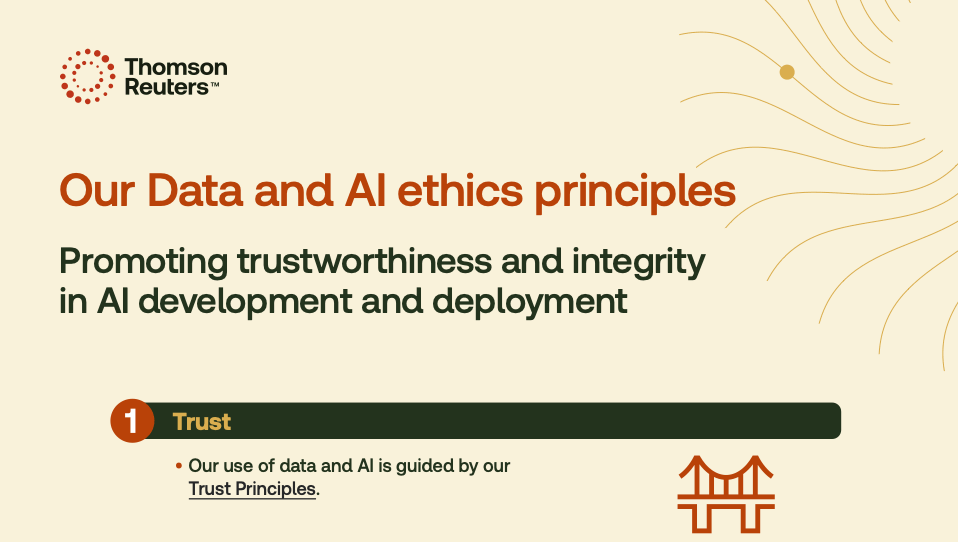How trusted data and rigorous safeguards set CoCounsel apart in legal AI
In the rush to adopt generative AI, the legal profession stands at a crossroads. While the power of large language models (LLMs) is undeniable, the risks are equally significant. Hallucinated case law, misunderstood precedents, and unreliable sources can turn a time-saving tool into a liability.
So, how do you harness the power of AI without compromising the standards of legal practice?
In a recent discussion, Valerie McConnell, Vice President of Solutions Engineering at Thomson Reuters, provided a look under the hood of CoCounsel, their legal AI platform. The core philosophy is a departure from the mainstream “do-everything” approach of consumer-grade AI. Their lodestar, as she puts it, is reliability.
Here’s a breakdown of CoCounsel’s foundational principles and why they matter for every legal professional.
The core problem: The “noise” of the open web
Most generative AI models, including ChatGPT and Claude, are trained on the vast, unstructured data of the open internet. While this makes them incredibly versatile, it poses a LLM fundamental problem for legal work. The web is noisy.
As McConnell explains from her prior experience at a legal tech startup, this “noise” creates significant issues:
- Lack of Authority: The web contains not just case law, but also blog comments, outdated articles, and forum discussions about cases, making it impossible for an AI to distinguish authoritative sources from incorrect opinions.
- Poor Data Structure: Critical context is often missing. For example, majority, concurring, and dissenting opinions are not always clearly labeled, leading to models confusing them and misstating the holding of a case.
- No Reliable Citator: There is no “KeyCite” for the open web. An AI has no systematic way to know if a case has been overturned or criticized, leading it to cite bad law with confidence.
“The problem wasn’t the model,” McConnell notes, “it was the noise in the data.”
The CoCounsel difference: Grounded in trusted legal content
Instead of trying to clean up the entire internet, CoCounsel’s approach is to use a better data source from the start. The model is grounded in the trusted, continuously updated content of Westlaw and Practical Law.
This isn’t just an integration; it’s the foundation. This means CoCounsel’s answers are:
- Authoritative: Pulled directly from vetted legal sources.
- Transparent: Always linked to citations that users can check, revealing the AI’s “chain of thought.”
- Accurate: With a dramatically lower risk of hallucination because the underlying data is reliable.
Beyond data: Building an AI that “thinks” like a lawyer
Perhaps the most significant differentiator is that CoCounsel is an agentic AI. It doesn’t just generate text by predicting the next word. It’s programmed to execute tasks by following the same best practices a seasoned lawyer would.
- For Legal Research: It doesn’t just run a query and summarize the results. It formulates a research plan, checks citation histories, consults secondary sources, and evaluates authorities.
- For Legal Drafting: It doesn’t “guess” what should be in a motion for summary judgment. It follows checklists, treatises, and practical guides to construct the document, ensuring it adheres to best-in-class legal standards.
This agentic workflow is why CoCounsel won’t draft a complex document from a one-sentence prompt. An AI is not a mind reader; to draft reliably, it needs the same context a lawyer would—facts, client documents, and relevant case law.
The unseen engine: A culture of relentless testing and safeguards
To ensure its “lodestar of reliability,” Thomson Reuters has built an extensive system of guardrails and testing protocols.
- LLM as a Judge: The team creates “law school-style exams” with ideal answers. These are used to benchmark the model’s output, with AI agents grading the work of other agents against the expert-created standard.
- Manual Attorney Review: In addition to automated checks, teams of practicing attorneys manually review and validate the AI’s output before any new skill is released.
- Continuous Benchmarking: Every night, each CoCounsel skill is subjected to over 1,500 tests. The team also constantly evaluates the latest models from OpenAI, Google, Anthropic, and others, ensuring CoCounsel runs on the best available technology specifically benchmarked for legal work.
We do not let CoCounsel do anything it has not been trained and tested on. That’s part of our commitment to reliability.
Vice President of Solutions Engineering at Thomson Reuters
A look ahead: The future of relilable legal drafting
This deliberate, safety-first approach is guiding CoCounsel’s ambitious roadmap. Upcoming features, like the ability to draft a complaint, will follow this same philosophy. The AI will first research Westlaw to assess claims, evaluate pleading standards for the specific jurisdiction, and then construct a complaint that is both substantively sound and procedurally compliant.
It’s a measured approach, but one designed to build trust. By prioritizing accuracy over unchecked flexibility, CoCounsel aims to be a true partner in the practice of law—one that enhances a lawyer’s ability without introducing unnecessary risk.














